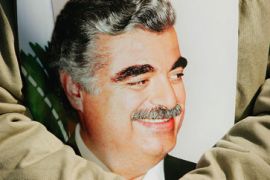Lebanon: Two years of crisis
The key events in Lebanon since the assassination of former PM Rafiq al-Hariri.

Lebanon was rocked by two bus bombs on Tuesday, the latest in a string of attacks in the two years since the assassination of Rafiq al-Hariri, the former prime minister.
2005
February 14 Rafiq al-Hariri is killed in a massive suicide bomb blast in Beirut.
The UN Security Council demands Syria pull out its remaining troops. There are about 14,000 Syrian troops in the country. In the 1980s they numbered 30,000.
March 14 Around a million Lebanese turn out for an anti-Syrian protest.
March 23 Three people die in one of several car bombings targeting Christian areas in Lebanon.
April 7 The UN Security Council sets up an inquiry into al-Hariri’s assassination.
April 26 Syria completes the withdrawal of troops from Lebanon, ending a 29-year military presence.
June 2 A Samir Kassir, a prominent journalist and vocal critic of Syria, is killed by a car bomb.
|
|
June 30 Fouad Siniora, a former finance minister and moderate ally of al-Hariri, is appointed prime minister of the first government since the removal of Syrian presence in Lebanon following parliamentary elections that see the March 14 movement, led by al-Hariri’s son Rafik, win the most seats.
July 19 Siniora forms a government which for the first time includes Hezbollah, whose forces control much of southern Lebanon.
September 25 A car bombing badly injures May Chidiac, a prominent Christian television journalist who is critical of Syria‘s role in the country.
October 12 Ghazi Kanaan, Syria‘s former strongman in Lebanon, commits suicide in Damascus.
October 20 A UN report concludes that senior Syrian officials most likely approved al-Hariri’s murder.
December 12 Gibran Tueni, a prominent anti-Syrian journalist and MP, is killed in a car bombing.
2006
July 16 The capture by Hezbollah forces of two Israeli soldiers sparks a month-long conflict which kills more than 1,200 people in Lebanon and about 160 in Israel.
August 14 A ceasefire takes effect following UN resolution 1701 which calls for the strengthening of an existing UN force in southern Lebanon.
October 1 Israel withdraws its remaining soldiers from Lebanon, as government troops deploy along the border for the first time in decades.
November 11-12 Six ministers, including all five Shia ministers from hezbollah and the Amal party, quit the government. Hassan Nasrallah, the leader of Hezbollah, demands new elections or an increased role for his followers in government.
November 21 Transport minister Pierre Gemayel, from the predominately Christian Phalange party, is assassinated in his car in north Beirut.
Thousands later attend his funeral in a show of pro-government support in central Beirut
December 1 The opposition begins a sit-in in Martyrs’ Square and say they will not leave until the government stands down.
2007
January 23 Three people are killed in clashes during a one-day general strike called by opposition groups and unions.
January 25 Four people are killed in fighting between pro and anti-government demonstrators, sparked by an argument in a university canteen, overshadowing a Paris aid conference where donors pledge $7.6 billion for reconstruction.
 |
February 6 The UN endorses the Lebanese government’s plans for an international tribunal to try those belived to be responsible for the murder of al-Hariri.
February 8 Lebanese and Israeli troops exchange fire across the border. It is the first such clash in decades between Israel and the Lebanese army.
February 13 Three people are killed and 20 wounded in the bombing of two buses in a Christian area northeast of Beirut. It is the first time in recent years that civilians, as opposed to politicians or high-profile journalists, are targeted.
February 14 Tens of thousands gather in Beirut for a memorial rally to mark the second anniversary of the assasination of Rafik al-Hariri.
